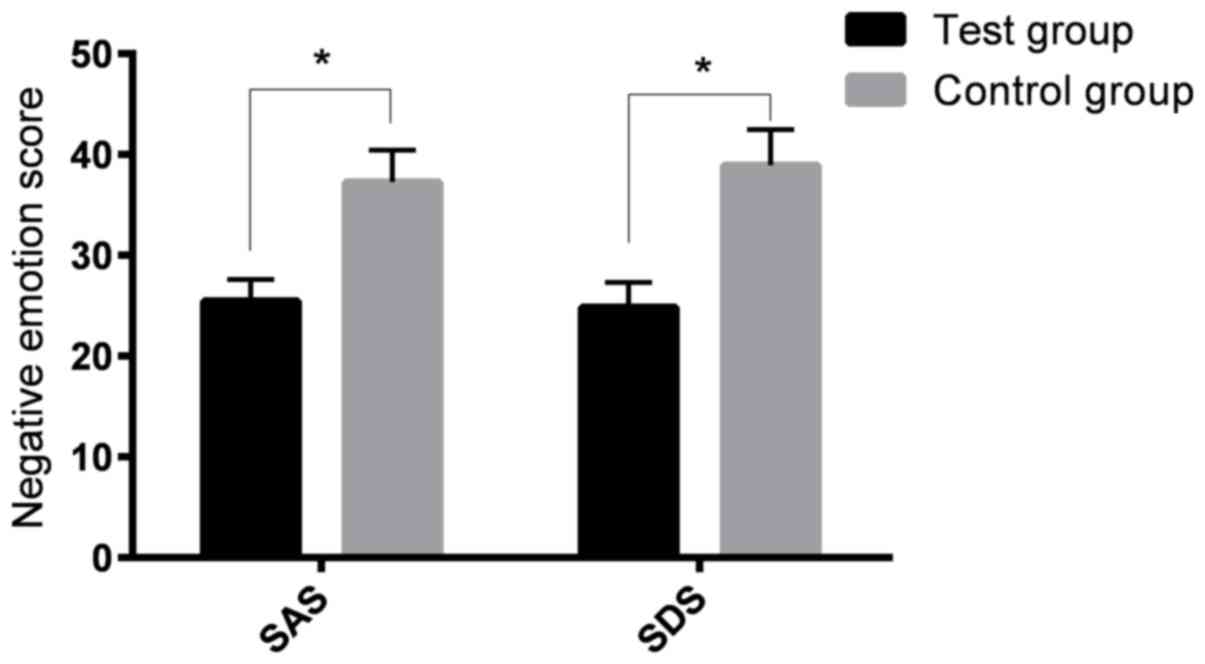|
1
|
Chou R, Gordon DB, de Leon-Casasola OA,
Rosenberg JM, Bickler S, Brennan T, Carter T, Cassidy CL,
Chittenden EH, Degenhardt E, et al: Management of postoperative
pain: A clinical practice guideline from the American pain pociety,
the American Society of Regional Anesthesia and Pain Medicine, and
the American Society of Anesthesiologists' Committee on regional
anesthesia, executive committee, and Administrative Council. J
Pain. 17:131–157. 2016.PubMed/NCBI
|
|
2
|
Rawal N: Current issues in postoperative
pain management. Eur J Anaesthesiol. 33:160–171. 2016.PubMed/NCBI
|
|
3
|
Stormark K, Søreide K, Søreide JA, Kvaløy
JT, Pfeffer F, Eriksen MT, Nedrebø BS and Kørner H: Nationwide
implementation of laparoscopic surgery for colon cancer: Short-term
outcomes and long-term survival in a population-based cohort. Surg
Endosc. 30:4853–4864. 2016.PubMed/NCBI
|
|
4
|
Pogatzki-Zahn E, Kutschar P, Nestler N and
Osterbrink J: A prospective multicentre study to improve
postoperative pain: Identification of potentialities and problems.
PLoS One. 10:e01435082015.PubMed/NCBI
|
|
5
|
Zhou X, Zhang C, Wang M, Yu L and Yan M:
Dezocine for preventing postoperative pain: A meta-analysis of
randomized controlled trials. PLoS One. 10:e01360912015.PubMed/NCBI
|
|
6
|
Wilson NM, Ripsch MS and White FA: Impact
of opioid and nonopioid drugs on postsurgical pain management in
the rat. Pain Res Treat. 2016:83647622016.PubMed/NCBI
|
|
7
|
Berterame S, Erthal J, Thomas J, Fellner
S, Vosse B, Clare P, Hao W, Johnson DT, Mohar A, Pavadia J, et al:
Use of and barriers to access to opioid analgesics: A worldwide,
regional, and national study. Lancet. 387:1644–1656.
2016.PubMed/NCBI
|
|
8
|
Abdel Shaheed C, Maher CG, Williams KA,
Day R and McLachlan AJ: Efficacy, tolerability, and dose-dependent
effects of opioid analgesics for low back pain: A systematic review
and meta-analysis. JAMA Intern Med. 176:958–968. 2016.PubMed/NCBI
|
|
9
|
Hoemann C, Kandel R, Roberts S, Saris DB,
Creemers L, Mainil-Varlet P, Méthot S, Hollander AP and Buschmann
MD: International Cartilage Repair Society (ICRS) recommended
guidelines for histological endpoints for cartilage repair studies
in animal models and clinical trials. Cartilage. 2:153–172.
2011.PubMed/NCBI
|
|
10
|
Wang N, Zhou H, Song X and Wang J:
Comparison of oxycodone and sufentanil for patient-controlled
intravenous analgesia after laparoscopic radical gastrectomy: A
randomized double-blind clinical trial. Anesth Essays Res.
10:557–560. 2016.PubMed/NCBI
|
|
11
|
Ge DJ, Qi B, Tang G and Li JY:
Intraoperative dexmedetomidine promotes postoperative analgesia and
recovery in patients after abdominal hysterectomy: A double-blind,
randomized clinical trial. Sci Rep. 6:215142016.PubMed/NCBI
|
|
12
|
Zhang XK, Chen QH, Wang WX and Hu Q:
Evaluation of dexmedetomidine in combination with sufentanil or
butorphanol for postoperative analgesia in patients undergoing
laparoscopic resection of gastrointestinal tumors: A
quasi-experimental trial. Medicine (Baltimore).
95:e56042016.PubMed/NCBI
|
|
13
|
Chen MK, Chau SW, Shen YC, Sun YN, Tseng
KY, Long CY, Feng YT and Cheng KI: Dose-dependent attenuation of
intravenous nalbuphine on epidural morphine-induced pruritus and
analgesia after cesarean delivery. Kaohsiung J Med Sci. 30:248–253.
2014.PubMed/NCBI
|
|
14
|
Chatrath V, Attri JP, Bala A, Khetarpal R,
Ahuja D and Kaur S: Epidural nalbuphine for postoperative analgesia
in orthopedic surgery. Anesth Essays Res. 9:326–330.
2015.PubMed/NCBI
|
|
15
|
Fried GM, Feldman LS, Vassiliou MC, Fraser
SA, Stanbridge D, Ghitulescu G and Andrew CG: Proving the value of
simulation in laparoscopic surgery. Ann Surg. 240:518–528.
2004.PubMed/NCBI
|
|
16
|
Buunen M, Veldkamp R, Hop WC, Kuhry E,
Jeekel J, Haglind E, Påhlman L, Cuesta MA, Msika S, Morino M, et al
Colon Cancer Laparoscopic or Open Resection Study Group, : Survival
after laparoscopic surgery versus open surgery for colon cancer:
Long-term outcome of a randomised clinical trial. Lancet Oncol.
10:44–52. 2009.PubMed/NCBI
|
|
17
|
Benz S, Barlag H, Gerken M, Fürst A and
Klinkhammer-Schalke M: Laparoscopic surgery in patients with colon
cancer: A population-based analysis. Surg Endosc. 31:2586–2595.
2017.PubMed/NCBI
|
|
18
|
Buunen M, Veldkamp R, Hop WC, Kuhry E,
Jeekel J, Haglind E, Påhlman L, Cuesta MA, Msika S, et al: Survival
after laparoscopic surgery versus open surgery for colon cancer:
Long-term outcome of a randomised clinical trial. Lancet Oncol.
10:44–52. 2009.PubMed/NCBI
|
|
19
|
Beaver WT and Feise GA: A comparison of
the analgesic effect of oxymorphone by rectal suppository and
intramuscular injection in patients with postoperative pain. J Clin
Pharmacol. 17:276–291. 1977.PubMed/NCBI
|
|
20
|
Yeh YC, Lin TF, Chang HC, Chan WS, Wang
YP, Lin CJ and Sun WZ: Combination of low-dose nalbuphine and
morphine in patient-controlled analgesia decreases incidence of
opioid-related side effects. J Formos Med Assoc. 108:548–553.
2009.PubMed/NCBI
|
|
21
|
Minai FN and Khan FA: A comparison of
morphine and nalbuphine for intraoperative and postoperative
analgesia. J Pak Med Assoc. 53:391–396. 2003.PubMed/NCBI
|
|
22
|
Park JS, Choi GS, Kwak KH, Jung H, Jeon Y,
Park S and Yeo J: Effect of local wound infiltration and
transversus abdominis plane block on morphine use after
laparoscopic colectomy: A nonrandomized, single-blind prospective
study. J Surg Res. 195:61–66. 2015.PubMed/NCBI
|
|
23
|
Buhle JT, Kober H, Ochsner KN,
Mende-Siedlecki P, Weber J, Hughes BL, Kross E, Atlas LY, McRae K
and Wager TD: Common representation of pain and negative emotion in
the midbrain periaqueductal gray. Soc Cogn Affect Neurosci.
8:609–616. 2013.PubMed/NCBI
|















